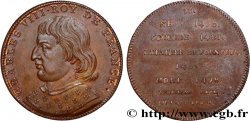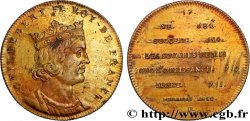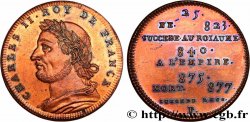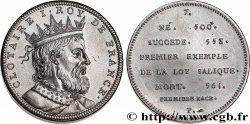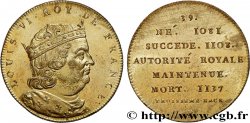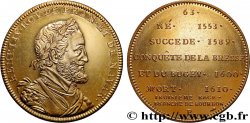E-auction 648-660234 - SÉRIE MÉTALLIQUE DES ROIS DE FRANCE Médaille, HENRI IV - 63 - refrappe ultra-moderne
得先注册又得到批准才可以报价。为了报价注册. 客户应该得到公司允许,那种过程需要 48 个小时。别等出售结束那一天才登记。您报价的话等于您赞成买那物品,而且按« 保价 » 证明您接受 cgb.fr 因特网拍卖使用法.
报价时只可以出全数值欧元总额。物品描述也说明销售结束时间,结束后出价都不会生效。 报价命令转达有时变动,等到最后秒钟增加否决的可能会。想多了解的话请注意 因特网拍卖常问
购货人不付费
购货人不付费
种类 Médaille, HENRI IV - 63 - refrappe ultra-moderne
日期: n.d.
材质 gilt bronze
直径 34 mm
模子方针 12 h.
重量 21,04 g.
侧面 lisse
印模 sans poinçon
关于品相的说明
Patine hétérogène avec des traces de manipulation et rayures
正面
正面的文字 HENRI IV ROY DE FRAN. ET DE NAVAR..
正面的说明书 Buste lauré et cuirassé à droite.
背面
背面的文字 63. / NÉ. 1553. / SUCCEDE. 1589. / CONQUETE DE LA BRESSE ET DU BUGEY. 1600. / MORT. 1610. / TROISIEME RACE. / BRANCHE DE BOURBON / P..
背面的说明书 Légende en 9 lignes et corne de l’abondance à l’exergue.
评论
Médaille conservée sous capsule et dorée à l’or fin. Refrappe ultra-moderne des séries de jetons.
Henri IV, né Henri de Bourbon (13 décembre 1553 à Pau - 14 mai 1610 à Paris) fut roi de Navarre (Henri III de Navarre, 1572-1610) puis roi de France (1589-1610), premier souverain français de la branche dite de Bourbon de la dynastie capétienne.
Il était le fils de Jeanne III, de son nom patronymique Jeanne d'Albret, reine de Navarre et d'Antoine de Bourbon, chef de la maison de Bourbon, descendant du roi Louis IX et premier prince de sang. En vertu de la « loi salique » cette filiation fera d'Henri le successeur naturel du roi de France à la mort de François, duc d'Anjou (frère et héritier du roi Henri III), en 1584.
Contemporain d'un siècle ravagé par les guerres de religion, il y fut d'abord lourdement impliqué en tant que prince de sang et chef protestant avant d'accéder au trône de France (Lui-même dut changer plusieurs fois de religion avant son accession au trône). Pour être accepté comme roi, il se convertit au catholicisme, et signa l'Édit de Nantes, traité de paix tolérant dans certaines limites le culte protestant, qui mit fin pendant deux décennies aux guerres de religion. Alors qu'il préparait une guerre contre l'Espagne, il fut assassiné le 14 mai 1610 par un fanatique charentais, François Ravaillac, rue de la Ferronnerie à Paris.
Pour la suite de sa biographie, voir http://fr.wikipedia.org/wiki/Henri_IV_de_France.
Medal preserved in a capsule and gilded with fine gold. Ultra-modern re-minting of token series.
Henry IV, born Henry of Bourbon (December 13, 1553 in Pau - May 14, 1610 in Paris) was King of Navarre (Henry III of Navarre, 1572-1610) then King of France (1589-1610), first French sovereign of the so-called Bourbon branch of the Capetian dynasty.
He was the son of Jeanne III, patronymic name Jeanne d'Albret, Queen of Navarre and Antoine de Bourbon, head of the House of Bourbon, descendant of King Louis IX and first prince of the blood. Under the \\\"Salic law\\\" this lineage will make Henry the natural successor to the King of France upon the death of Francis, Duke of Anjou (brother and heir of King Henry III), in 1584.
Contemporary of a century ravaged by religious wars, he was first heavily involved as a prince of the blood and Protestant leader before acceding to the throne of France (He himself had to change religion several times before his accession to the throne). To be accepted as king, he converted to Catholicism and signed the Edict of Nantes, a peace treaty tolerating Protestant worship within certain limits, which put an end to the Wars of Religion for two decades.. While preparing for war against Spain, he was assassinated on May 14, 1610 by a fanatic from Charente, François Ravaillac, on rue de la Ferronnerie in Paris..
For the rest of his biography, see http://fr. Wikipedia. org/wiki/Henri_IV_de_France
Henri IV, né Henri de Bourbon (13 décembre 1553 à Pau - 14 mai 1610 à Paris) fut roi de Navarre (Henri III de Navarre, 1572-1610) puis roi de France (1589-1610), premier souverain français de la branche dite de Bourbon de la dynastie capétienne.
Il était le fils de Jeanne III, de son nom patronymique Jeanne d'Albret, reine de Navarre et d'Antoine de Bourbon, chef de la maison de Bourbon, descendant du roi Louis IX et premier prince de sang. En vertu de la « loi salique » cette filiation fera d'Henri le successeur naturel du roi de France à la mort de François, duc d'Anjou (frère et héritier du roi Henri III), en 1584.
Contemporain d'un siècle ravagé par les guerres de religion, il y fut d'abord lourdement impliqué en tant que prince de sang et chef protestant avant d'accéder au trône de France (Lui-même dut changer plusieurs fois de religion avant son accession au trône). Pour être accepté comme roi, il se convertit au catholicisme, et signa l'Édit de Nantes, traité de paix tolérant dans certaines limites le culte protestant, qui mit fin pendant deux décennies aux guerres de religion. Alors qu'il préparait une guerre contre l'Espagne, il fut assassiné le 14 mai 1610 par un fanatique charentais, François Ravaillac, rue de la Ferronnerie à Paris.
Pour la suite de sa biographie, voir http://fr.wikipedia.org/wiki/Henri_IV_de_France.
Medal preserved in a capsule and gilded with fine gold. Ultra-modern re-minting of token series.
Henry IV, born Henry of Bourbon (December 13, 1553 in Pau - May 14, 1610 in Paris) was King of Navarre (Henry III of Navarre, 1572-1610) then King of France (1589-1610), first French sovereign of the so-called Bourbon branch of the Capetian dynasty.
He was the son of Jeanne III, patronymic name Jeanne d'Albret, Queen of Navarre and Antoine de Bourbon, head of the House of Bourbon, descendant of King Louis IX and first prince of the blood. Under the \\\"Salic law\\\" this lineage will make Henry the natural successor to the King of France upon the death of Francis, Duke of Anjou (brother and heir of King Henry III), in 1584.
Contemporary of a century ravaged by religious wars, he was first heavily involved as a prince of the blood and Protestant leader before acceding to the throne of France (He himself had to change religion several times before his accession to the throne). To be accepted as king, he converted to Catholicism and signed the Edict of Nantes, a peace treaty tolerating Protestant worship within certain limits, which put an end to the Wars of Religion for two decades.. While preparing for war against Spain, he was assassinated on May 14, 1610 by a fanatic from Charente, François Ravaillac, on rue de la Ferronnerie in Paris..
For the rest of his biography, see http://fr. Wikipedia. org/wiki/Henri_IV_de_France








 对产品描述纠错
对产品描述纠错 打印
打印 分享我的选择
分享我的选择 提问
提问 Consign / sell
Consign / sell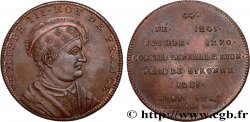
 产品介绍
产品介绍